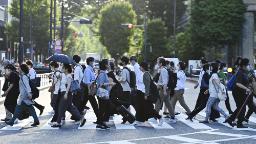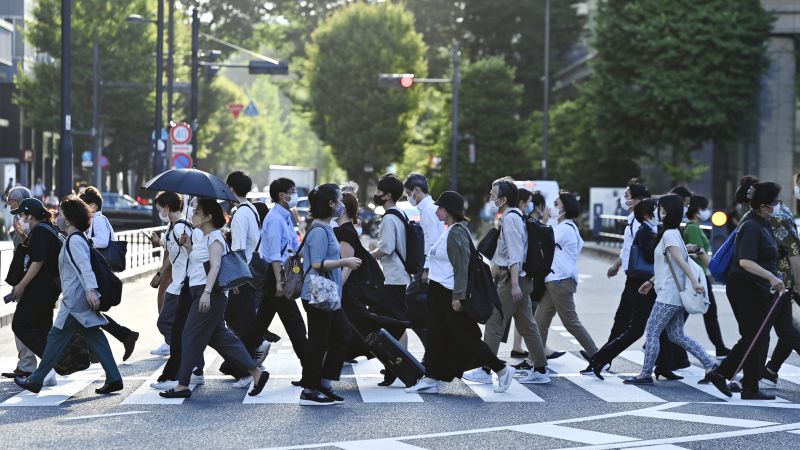Japan’s population drops by half a million in 2022 | CNN

Tokyo, Japan
CNN
—
Japan’s population has fallen for the 12th consecutive year, as deaths rise and the birth rate continues to sink, according to government data released Wednesday.
The population stood at 124.49 million in 2022 – representing a decline of 556,000 from the previous year, figures show.
That figure represents both the natural change in population – meaning deaths and births – and the flow of people entering and exiting the country.
The natural change last year was the biggest on record, with a fall of 731,000 – cushioned by the influx of people entering Japan, which provided an increase of 175,000, said Cabinet Chief Cabinet Secretary Hirokazu Matsuno in a news conference on Wednesday.
“It is essential to take firm measures to address the declining birthrate, which is a major factor in the decline in population, as one of the top priority issues to be addressed,” said Matsuno.
Japan has one of the lowest birth rates in the world, as well as one of the highest life expectancies; in 2020, nearly one in 1,500 people in Japan were age 100 or older, according to government data.
That means a swelling elderly population, shrinking workforce, and not enough young people to fill in the gaps – posing a demographic crisis decades in the making.
The trend is seen across the country, with all of Japan’s 47 prefectures except Tokyo reporting a decline in residents last year, according to the data released Wednesday. One village in central Japan recorded just one newborn child in 25 years – a birth that was heralded as a miracle for the town’s elderly residents.
The situation is so dire that Japan’s Prime Minister Fumio Kishida warned lawmakers in January that the country is “on the brink of not being able to maintain social functions” due to the falling birth rate.
He added that child-rearing support was the government’s “most important policy,” and solving the issue “simply cannot wait any longer.”
Some researchers and climate scientists argue that population decline could benefit our battered ecosystems and lower emissions as the climate crisis worsens. But it also spells trouble for countries like Japan, with fewer workers to fund pensions and healthcare, and fewer people to look after the elderly.
In April, Japan launched its new Children and Families Agency, which focuses on measures to support parents such as establishing more daycare centers, and provides youth services such as counseling.
Previous similar initiatives, often carried out by local authorities, have so far failed to turn things around.
Busy urban lifestyles and long working hours leave little time for some Japanese to start families, and the rising costs of living that mean having a baby is simply too expensive for many young people.
In 2022, Japan was ranked one of the world’s most expensive places to raise a child, according to research from financial institution Jefferies. And yet, the country’s economy has stalled since the early 1990s, meaning frustratingly low wages and little upward mobility.
The drop in the number of Japanese nationals in the past year also highlights the government’s deeply conservative views on immigration. Foreigners accounted for just 2.2% of the population in 2021, according to the Japanese government, compared to 13.6% in the United States.
These attitudes are widespread among the public, too; a 2021 study by the Pew Research Center found that about half of Japanese adults say having a diverse society makes their country a worse place to live – though this percentage is lower than in previous years.
For all the latest world News Click Here

